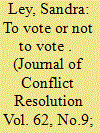| Srl | Item |
| 1 |
ID:
188997


|
|
|
|
|
| Summary/Abstract |
When and why do citizens living amid criminal violence pour into the streets to demand peace and justice, regardless of the risks that protesting in such a context may entail? While victimization experiences provide an initial motivation for participation in protests, this article finds that social networks play a fundamental role for mobilization against insecurity. At an emotional level, socialization within networks helps transform the feelings of individual fear that crime evokes into collective anger that represents potential for action. As individuals become more engaged with one another, their feelings are transformed from being exclusively self-oriented towards other-oriented. Additionally, denser network interactions insulate participants from coercion and generate support mechanisms for their members, creating a sense of security. Thus, networks have the power to transform perceptions of the risks and effectiveness associated with their collective action against crime. Supporting evidence for this argument is derived from original survey data collected in Mexico in 2012. Additionally, in-depth interviews with protest participants reveal the mechanisms through which social networks stimulate protest participation, among both victims and non-victims. This article contributes to the prevailing literature on victimization and political participation and provides new answers on when and how experience with violence can encourage involvement in politics and promote democratic accountability.
|
|
|
|
|
|
|
|
|
|
|
|
|
|
|
|
| 2 |
ID:
161605


|
|
|
|
|
| Summary/Abstract |
Organized crime-related violence has important electoral consequences. Analyses of aggregate panel data on Mexican elections and an original postelectoral survey conducted in Mexico show that the strategic use of violence by organized crime groups during electoral campaigns demobilizes voters at large. Regions where criminal organizations attempted to influence elections and politics by targeting government officials and party candidates exhibited significantly lower levels of electoral participation. Consistently, at the individual level, results reveal that voters living in regions where organized crime engaged in high-profile violence were more cautious when deciding whether to vote or not. Prior research has focused on the role of crime victimization in nonelectoral participation, but the empirical evidence presented here suggests that the impact of a criminal context on turnout transcends personal victimization experiences.
|
|
|
|
|
|
|
|
|
|
|
|
|
|
|
|